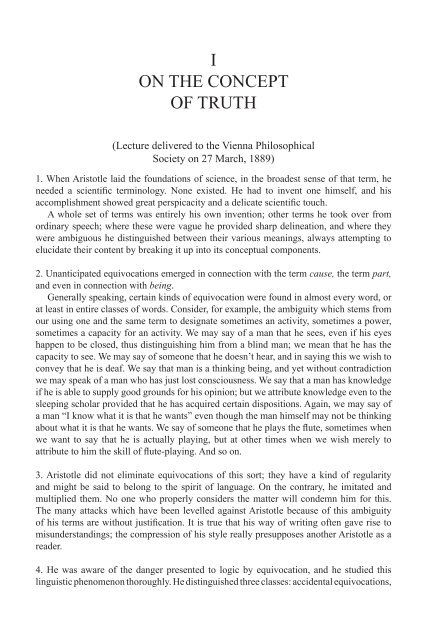Franz Brentano_The True and the Evident.pdf
Franz Brentano_The True and the Evident.pdf
Franz Brentano_The True and the Evident.pdf
Create successful ePaper yourself
Turn your PDF publications into a flip-book with our unique Google optimized e-Paper software.
I<br />
ON THE CONCEPT<br />
OF TRUTH<br />
(Lecture delivered to <strong>the</strong> Vienna Philosophical<br />
Society on 27 March, 1889)<br />
1. When Aristotle laid <strong>the</strong> foundations of science, in <strong>the</strong> broadest sense of that term, he<br />
needed a scientific terminology. None existed. He had to invent one himself, <strong>and</strong> his<br />
accomplishment showed great perspicacity <strong>and</strong> a delicate scientific touch.<br />
A whole set of terms was entirely his own invention; o<strong>the</strong>r terms he took over from<br />
ordinary speech; where <strong>the</strong>se were vague he provided sharp delineation, <strong>and</strong> where <strong>the</strong>y<br />
were ambiguous he distinguished between <strong>the</strong>ir various meanings, always attempting to<br />
elucidate <strong>the</strong>ir content by breaking it up into its conceptual components.<br />
2. Unanticipated equivocations emerged in connection with <strong>the</strong> term cause, <strong>the</strong> term part,<br />
<strong>and</strong> even in connection with being.<br />
Generally speaking, certain kinds of equivocation were found in almost every word, or<br />
at least in entire classes of words. Consider, for example, <strong>the</strong> ambiguity which stems from<br />
our using one <strong>and</strong> <strong>the</strong> same term to designate sometimes an activity, sometimes a power,<br />
sometimes a capacity for an activity. We may say of a man that he sees, even if his eyes<br />
happen to be closed, thus distinguishing him from a blind man; we mean that he has <strong>the</strong><br />
capacity to see. We may say of someone that he doesn’t hear, <strong>and</strong> in saying this we wish to<br />
convey that he is deaf. We say that man is a thinking being, <strong>and</strong> yet without contradiction<br />
we may speak of a man who has just lost consciousness. We say that a man has knowledge<br />
if he is able to supply good grounds for his opinion; but we attribute knowledge even to <strong>the</strong><br />
sleeping scholar provided that he has acquired certain dispositions. Again, we may say of<br />
a man “I know what it is that he wants” even though <strong>the</strong> man himself may not be thinking<br />
about what it is that he wants. We say of someone that he plays <strong>the</strong> flute, sometimes when<br />
we want to say that he is actually playing, but at o<strong>the</strong>r times when we wish merely to<br />
attribute to him <strong>the</strong> skill of flute-playing. And so on.<br />
3. Aristotle did not eliminate equivocations of this sort; <strong>the</strong>y have a kind of regularity<br />
<strong>and</strong> might be said to belong to <strong>the</strong> spirit of language. On <strong>the</strong> contrary, he imitated <strong>and</strong><br />
multiplied <strong>the</strong>m. No one who properly considers <strong>the</strong> matter will condemn him for this.<br />
<strong>The</strong> many attacks which have been levelled against Aristotle because of this ambiguity<br />
of his terms are without justification. It is true that his way of writing often gave rise to<br />
misunderst<strong>and</strong>ings; <strong>the</strong> compression of his style really presupposes ano<strong>the</strong>r Aristotle as a<br />
reader.<br />
4. He was aware of <strong>the</strong> danger presented to logic by equivocation, <strong>and</strong> he studied this<br />
linguistic phenomenon thoroughly. He distinguished three classes: accidental equivocations,
















